Key research themes
1. How does depth of vocabulary knowledge contribute to performance in different language skills and reading comprehension?
This research area investigates the multifaceted role of vocabulary depth—how well words are known beyond mere recognition—in facilitating proficiency across receptive and productive language skills, particularly in reading comprehension. It matters because depth of vocabulary knowledge involves not only knowing meanings but also morphological, syntactic, and relational aspects of words, which significantly impact language comprehension and production.
2. What are effective approaches to assessing depth of vocabulary knowledge, and how do levels or stages of word knowledge inform this assessment?
This line of investigation focuses on developing reliable, multidimensional frameworks and scales to measure depth of vocabulary knowledge, distinguishing receptive and productive knowledge and various stages from unknown to full command. Understanding and measuring vocabulary depth comprehensively informs pedagogical approaches, test development, and learner diagnostics.
3. How can language learning strategies, glosses, and frequency of word exposure enhance acquisition of depth of vocabulary knowledge in L2 learners?
This theme examines how instructional and learner strategies—including vocabulary learning strategies (VLS), multimedia glosses, and repeated word exposure—facilitate the acquisition and retention of word knowledge depth, which is essential for vocabulary mastery and communicative competence.







































































































































